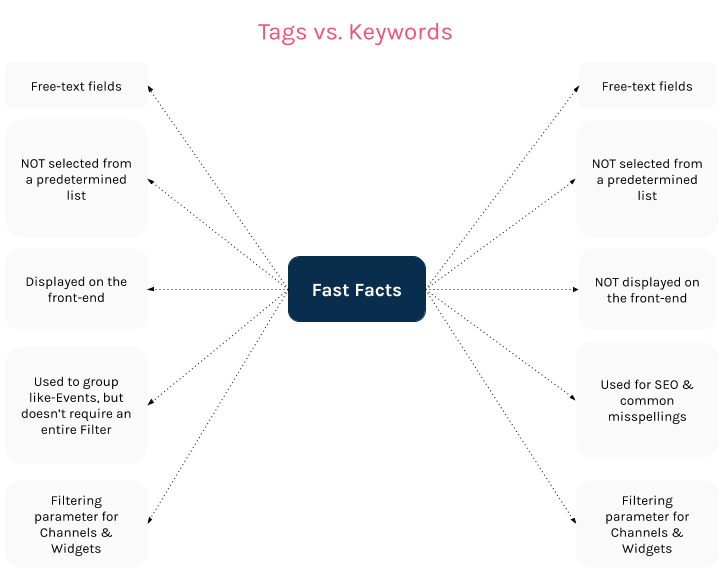Tags & Keywords
Tags & Keywords are great for short-term categories, ultra-specific categories, promoting, or for SEO purposes. Functionally, Tags & Keywords are the same, the main difference is the display - Tags are seen by the public whereas Keywords are hidden and only seen by search engines.
Tags
Tags allow grouping with a like identifier that doesn’t warrant an entire unique Filter. For example, if your organization has a Filter called "Holidays & Celebrations" and you're adding a Halloween Gala, the event could be tagged with "Halloween", "Halloween Gala," etc.
- Tags are created in a free-text field and are not selected from a pre-determined list.
- Tags are displayed on the Event Details Page below your Filters.
Tags FAQ
Can I use special characters with Tags and Keywords?
Keywords
Keywords are effectively hidden tags as they are only used for internal purposes. They are not displayed anywhere on the calendar. There are two common uses for keywords:
- SEO & Misspellings: If any detail of an event, such as a speaker’s name or the location, have common misspellings or other monikers, noting them as a Keyword will ensure that the most possible queries will pull the event in Localist.
- Widget & Channel Filtering: Keywords (and Tags) are available as a filtering parameter for Widgets and Channels. Since Keywords are hidden, they are commonly used for admins to mark specific events for a Widget/Channel. For example, "HomepageWidget," "AthleticsChannel," or "PartnerWidget."
Assigning Tags & Keywords
These items are available on the Admin Add Event Form in the Additional Details section Just start typing and hit enter on your keyboard after each Tag or Keyword.
In order for general users to use these fields effectively on the Public Submission Form, they would have to be knowledgable of Localist functions and terminology. Our goal is to keep the Public Submission Form as simple and fool-proof as possible. Since these are open text there could be an excess of different inputs if made available on the Public Submission Form. Instead, users are provided with Filters to label their event. This decreases confusion and clutter on the calendar.
Feature Face-Off
